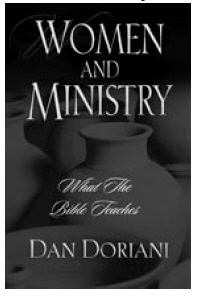Women and Ministry: What the Bible Teaches -- By: Christiane Carlson-Thies
Journal: Priscilla Papers
Volume: PP 19:2 (Spring 2005)
Article: Women and Ministry: What the Bible Teaches
Author: Christiane Carlson-Thies
Women and Ministry: What the Bible Teaches
Dan Doriani
(Crossway Books 2004)
Reviewed by
CHRISTIANE CARLSON-THIES has been a CBE member since its founding in 1987. She lives with her family in Annapolis, Maryland, where she is self-employed as a telecommunications consultant. Her biblical perspective is shaped by two years of study at the Toronto-based Institute for Christian Studies. Many of the ideas in this article were first presented to a D.C.-area CBE study group where she led a discussion on the complementarian theology of creation. A previous article, “Hermeneutics in Pink and Blue,” was published in Priscilla Papers, Fall 2002.

Dr. Dan Doriani, Adjunct Professor of New Testament at Covenant Seminary and Senior Pastor of Central Presbyterian Church in St. Louis, Mo., has written Women and Ministry: What the Bible Teaches in order to provide a biblical defense for traditional churches that exclude women from official teaching and leadership offices within their congregations. However, his other objective in writing this book is to show that change is necessary. The tradition governing men’s and women’s ministries in the church can—indeed must—be stretched beyond its current boundaries. There are ways, he argues, to increase women’s participation in church ministries without thereby weakening the basic principle of male spiritual authority.
Pastor Doriani’s high view of women’s gifts and his vision of engaging women in every area of church life for the upbuilding of the body of Christ are very encouraging. In addition, his positive remarks about designing grass-roots, decentralized church structures in which men and women work side-by-side—as they did in Paul’s churches—are well worth pursuing (130-131). The church, Doriani says, should practice the “principle of participation,” whereby gifted, godly women are invited to function informally in just about every area of church life, including areas that involve leading and teaching men; however, women should continue to be barred from the church’s authoritative teaching and leadership offices (128-129).
Does Dan Doriani’s “principle of participation” have the potential to resolve the concerns of both complementarians and egalitarians? After all, if egalitarians are not merely power hungry, but truly support women’s deepest desires to have church doors opened wide to their gifts of service and ministry, what difference should it make to women if their participation is formal or informal, titled or untitled, official or unofficial? And, if male leaders in traditional churches are not merely power hungry, but are authentically practicing servant-leade...
Click here to subscribe
